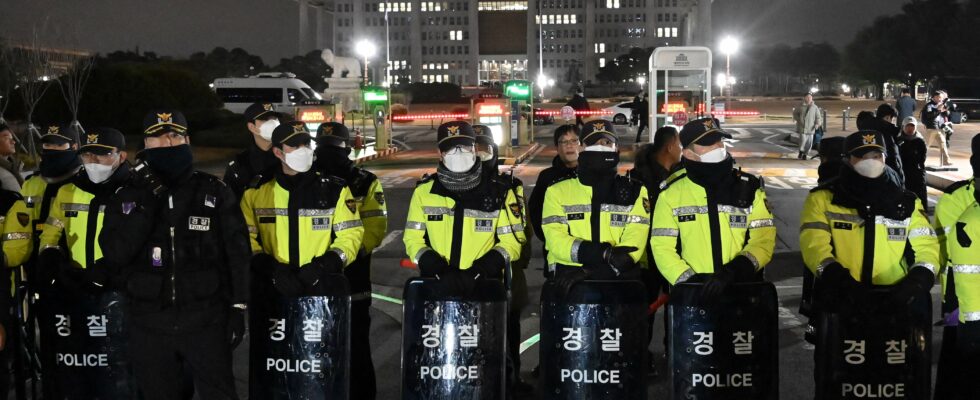“Haven’t you come in yet? What are you doing? Break the door and get them out, even if it means shooting.” These remarks by deposed South Korean President Yoon Suk Yeol, addressed to the military commander of Seoul on December 3, come from a prosecutor’s report consulted on Saturday December 28 by AFP. This report thus reveals that the president had authorized the army to open fire to enter Parliament during his attempt to impose martial law for which he was dismissed.
Martial law was proclaimed on December 3 to everyone’s surprise, while the president sent the army to Parliament to muzzle it, plunging the country into chaos. After martial law was declared, heavily armed soldiers stormed Parliament, scaling barriers, smashing windows and some landing by helicopter. According to the indictment report of former Defense Minister Kim Yong-hyun, believed to be the person who pushed President Yoon to impose martial law, the president also ordered the head of military counterintelligence, Gen. Kwak Jong-keun, to “quickly enter inside” Parliament.
“Get people out inside the assembly, destroy the doors with an ax if necessary,” he said, according to the prosecution, which adds that the president would have discussed martial law as early as March with senior military officials. As lawmakers rushed to reject martial law at dawn on December 4, President Yoon told Mr. Lee that he would declare it “a second and third time.”
The president’s lawyer, Yoon Kab-keun, told AFP that this information from the prosecution was biased and corresponded “neither to objective facts nor to common sense”.
In opposition, Democratic Party MP Kang Sun-woo said the prosecution’s report had “uncovered the terrible and undeniable truth about Yoon Suk Yeol, the ringleader of the betrayal”, calling for his “immediate” arrest.
Unprecedented crisis situation for the country
During a speech in December, Mr. Yoon said he was not considering a second attempt to proclaim martial law and apologized for the “anguish and inconvenience.” Dismissed from office, he was investigated for “rebellion”, a crime punishable by death, and officially remained president while awaiting a ruling from the Constitutional Court, confirming or overturning the decision of the deputies.
The Corruption Investigation Bureau, which centralizes investigations, has already summoned the deposed president twice to question him about the events of the night of December 3 to 4, which stunned the country. But Mr. Yoon did not appear for any of these summonses. Investigators sent him a third summons on Thursday for a hearing on Sunday morning.
On Friday, interim President Prime Minister Han Duck-soo was also impeached, with lawmakers accusing him of trying to obstruct the investigation into his predecessor’s coup.
The new interim head of state, Finance Minister Choi Sang-mok, promised to “put an end to the government crisis”, making it his “absolute priority”. But the situation is unprecedented for the country, plunged into uncertainty which caused its currency to plunge to its lowest level in sixteen years on Friday. Tens of thousands of people from both camps rallied in Seoul on Saturday, with anti-Yoon protesters carrying signs calling for the ousted president’s arrest.
